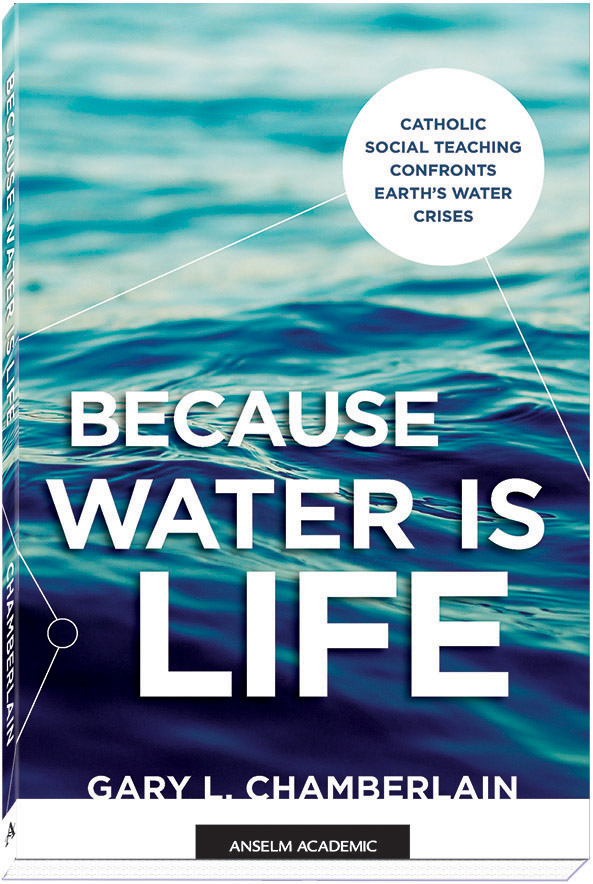Because Water Is Life
Catholic Social Teaching Confronts Earth's Water Crises
About This Book
Overview
Climate change. Pollution. Scarcity. Fracking. Privatization. Acidification. What can Catholicism’s “best-kept secret”—the social doctrine of the church—teach us about Earth’s water crisis?
In fact, it can teach us a lot.
Gary Chamberlain’s Because Water Is Life: Catholic Social Teaching Confronts Earth’s Water Crises explores the major issues we face when it comes to water by analyzing them through the lens of Catholic social teaching (CST). After introducing the principles of CST, Because Water Is Life explores narratives about real people and scenarios to unpack six contemporary water crises. With review and discussion questions and recommendations for additional research and reading, Because Water Is Life not only encourages critical thinking on some of today’s most pressing issues but also catalyzes action and inspires hope for developing a new water ethic.
Gary Chamberlain (1938-2018) was a professor of Christian ethics in the theology and religious studies department at Seattle University.
Details
| Weight | .5 lbs |
|---|---|
| Dimensions | 8.25 × .50 × 5.375 in |
| Pages | 188 |
| Print ISBN | 978-1-59982-914-2 |
| Item # | 7086 |
|---|
Customer Reviews
Gary Chamberlain brings the vital and energizing moral teachings of the Catholic Church to bear on the crises of pollution, hoarding, and overconsumption threatening our planet’s fresh waters. This book develops an original, accessible, and crucial argument relevant to anyone interested in Catholic social teaching, water, and environmental ethics. Because Water Is Life is an excellent and inspiring resource for classrooms, churches, and anyone who wants to think with religious tradition about how to build a better future on Earth.
Chamberlain’s book about water as life, as common good, and as sacrament for the whole world should wake us to greater care for our Earth and its water both as our home and a gift from God.
Because Water Is Life is a supple, specific, and critically engaging book that will be profoundly useful to teachers and students. Gary Chamberlain hones his analytic, constructive insights into a text that is utterly invaluable for all conversations about water and Catholic social teaching. I recommend this gripping and accessible book to everyone who seeks to understand further the legacy of CST and how that tradition offers pathways toward water ethics.
Table of Contents
Contents
Introduction
1. The Rise of Catholic Social Teaching
2. Climate Change as Structural Violence
3. A Polluted Earth in the Twenty-first Century
4. Water Scarcity for Most and Abundance for Few
5. Extraction from the Earth: Impacts of Mining
and Fracking on Water and People
6. Selling Water: Privatization of a Scarce Resource
7. The Right to Water
8. A New Water Ethic: Because Water Is Life
Additional Resources
Index
Professional Reviews
Because Water Is Life: Catholic Social Teaching Confronts Earth’s Water Crises.
By Gary L. Chamberlain. Winona, MN: Anselm Academic, 2018. 188 pages.
$21.95 (paper).
Chamberlain has written an informative, accessible, and helpful text that can be used as part of an undergraduate class in environmental studies, ethics, or Catholic social thought; it could also be useful for adult groups seeking to learn more about and take some action regarding the various global water crises facing our planet.
By integrating contemporary information about the various ways in which the global supply of clean water is being threatened by human action, an analysis of the ways in which these various crises create unjust suffering for the nation and world’s poor, and an application of the fundamental principles of Catholic social teaching, Chamberlain provides readers with both the data and the skills required to formulate a “new water ethic.”
At its heart this undergraduate textbook is a case study applying Catholic social teaching to the multiple global water crises in which hundreds of millions lack sufficient clean drinking water, billions have inadequate water for sanitation, and dozens of nations will soon endure crippling stresses to their water supply. Not surprisingly, Chamberlain follows John XXIII’s “see, judge, act” model of social analysis by presenting the “signs of the times” regarding the current state, shape, and causes of the water crises, then applying the lenses and principles of key CST documents to these water crises, and, finally, suggesting a new and revised global water ethic informed by this analysis. In this way the author provides readers with both a transparent set of arguments in support of useful actions to address the water crises and a clear method for identifying and resolving other social justice issues.
There are several reasons to recommend this extended and in-depth case study of the planet’s various water crises as an undergraduate classroom text or a resource for groups interested in knowing more about these water crises and acting to bring about environmental justice. The writing is clear, the arguments accessible, and the information solid and contemporary. All this makes for a persuasive brief in support of both concrete actions and systemic reforms to address the water crises. In addition, Chamberlain incorporates a number of powerful examples and anecdotes illustrating the damage and injustices associated with these crises. He offers several informative sidebar panels highlighting key points and invites thoughtful reflection and discussion with a series of questions in each chapter. One can sense the multiple approaches of a skillful college professor at work here.
In terms of content, there are three specific strengths of this case study. First, Chamberlain offers a thorough list and clear analysis of the various human activities threatening the global supply of clean drinking water, which include pollution, mining, fracking, various agricultural practices, and the increasing privatization of this basic resource. Second, the author uncovers the structural violence of climate change and the global water crises, processes in which wealthy societies inflict disproportionate and life-threatening harm on weaker and poorer nations and makes a strong case for people to organize and act against them. And finally, in addition to his arguments based on the traditional principles of Catholic social teaching, Chamberlain advances fresh arguments based on nature and water’s right to be protected from pollution and destruction. In this way the author, like some of the writers and activists he cites, continues to advance and expand the work of Catholic social teachings.
PATRICK T. MCCORMICK
Gonzaga University



